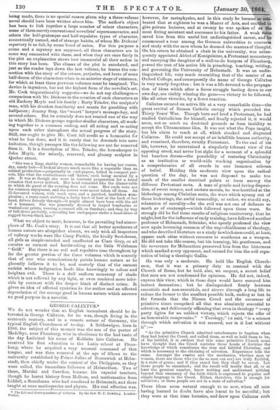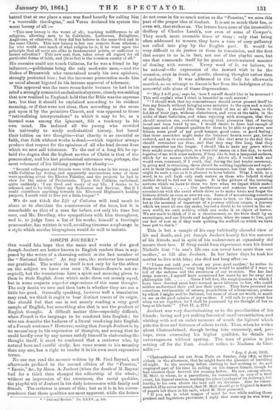GEORGE CALIXTUS.* WE do not wonder that an English incumbent
should be in- terested in George Calixtus, for he was, though living in the sixteenth century, and in a remote corner of Germany, the typical English Churchman of to-day. A Schleswiger, born in 1580, the subject of this memoir was the son of the pastor of Medelbye, near Flensburg, who in obedience to the bad taste of the day Latinized his name of Kallis5n into Calixtus. He received his first education in the Latin school at Flens- burg, where he acquired a very unusual command of that tongue, and was then removed at the age of fifteen to the university established by Prince Julius of Brunswick at Helm- stedt, then chiefly under the control of the Philippists, as they were called, the immediate followers of Melancthon. Two of these, Martini and Caselius, became his especial teachers, though he learnt history from Meibom, and mathematics from Liddell, a Scotchman who had wandered to Helmstedt, and there taught at once mathematics and physic. His real affection was,
The Life and Correspondence of Calixtus. By the Rev. W. C. Dowding. London : Parker. however, for metaphysics, and in this study he became so cele- brated that at eighteen be was a Master of Arts, and entitled to give private lectures, and at twenty he was spoken of as the most fitting assistant and successor to his father. A weak voice saved him from this useful but undistinguished career, and he commenced a tour among the German universities to converse and study with the men whom he deemed the masters of thought. On his return he obtained a chair in the university, was subse- quently appointed Abbot of Konigsliitter, a Protestant monastery,
and marrying the daughter of a well-to-do burgess of Flensburg, passed the rest of his active life in preaching, teaching, writing, and governing the University of Helmstedt. It was an undis- tinguished life, very much resembling that of the master of an Oxford College, and consequently the name of George Calixtus is very nearly forgotten but it was a life devoted to the propaga- tion of ideas which after a fierce struggle lasting down to our own day, are visibly winning the game—a victory to be followed, like all other victories, by a fierce reaction.
Calixtus entered on active life at a very remarkable time—the great revival of Roman Catholic energy which preceded the Thirty Years' War. Though born and bred a Protestant, he had studied Catholicism for himself, and finally rejected it, it would seem, not so much on doctrinal grounds as from inability to accept the Ultramontane idea. It was not what the Pope taught, but his claim to teach at all, which shocked and disgusted Calixtus. He could not accept of an infallible human authority, and remained, therefore, strictly Protestant. To the end of his life, however, he entertained a singularly tolerant view of the opposing creed, and never lost sight for a moment of a splendid but baseless dream—the possibility of restoring Christianity as an institution or world-wide working organization by a comprehension of all creeds in one immense scheme of belief. Holding this moderate view upon the radical question of the day, he was not disposed to make too much of the smaller doctrinal points at issue among the different Protestant sects. A man of gentle and loving disposi- tion, of sweet temper, and austere morals, he was horrified at the bickerings among Christian sects, the wars which sprang out of those bickerings, the awful immorality, or rather, we should say, relaxation of morality—for the evil was not one of defiance so much as of contempt—which followed upon those wars. So strongly did he feel these results of religious controversy, that he might,but for the influence of early training, have followed another professor of Helmstedt, Schriider, who openly professed the view now again becoming common of the unprofitableness of theology, andwho described literature as a study inwhichinen could, at least, oppose each other without recourse to anathema as a weapon. He did not take this course, but his learning, his gentleness, and his reverence for Melancthon preserved him from the bitterness. which marked every opponent, and earned for him the evil repu- tation of being a theologic Gallia He was only a moderate. He held like English Church- men, that it was a primary duty to contend with the Church of Rome, but he held, also, we suspect, a secret belief that men are not condemned for opinions. He did not, indeed, express this view, which in those days would have ensured him instant damnation ; but he distinguished firmly between essentials and non-essentials, and strove through a long life to reduce the former to the smallest possible bulk, ending at last in the formula that the Nicene Creed and the consensus of primitive times comprised all that was absolutely essential to salvation, and deliberately affirming that even in theology "every party fights for an unblest victory, which rejects the offer of an honourable compromise." "Theology," he said, "is a science through which salvation is not secured, nor is it lost without it" :—
" As the primitive Church admitted catechumens to baptism when they had learnt the Creed, and called them, as well as held them to be, of the faithful, it is evident that this same primitive Church must have thought that the Creed contains those heads of doctrine the knowledge of which constitutes the true and faithful Christian, and which is necessary to the obtaining of salvation. Experience tells the same. Amongst the rustics and the mechanics, whether men or women, there are those who (so far as man can see) are truly faithful, in a state of grace; and if they stand feet they shall be saved. Let these people be examined; and the result will testify that all, or at least the greatest number, know nothing and understand nothing beyond that summary of the faith which is expressed in popular and simple language in the Creed. Either, therefore, this is enough for salvation ; or these people are not in a state of salvation."
These ideas seem natural enough to us now, when all men having learned to doubt have also learnt to be merciful ; but they were at that time heresies, and drew upon Calixtus such
hatred that at one place a man was fined heavily for calling him a venerable theologian," and Veron declared his system the worst heresy of all :—
"This new heresy is the worst of all ; teaching indifference to all religions, allowing men to be Calvinists, Lutherans, Zninglians, Anglicans, or otherwise, if they did but believe in the same God and in the same Christ. This new heresy is but one remove from atheism ; for who world care much of what religion he is, if he went upon the principle that all sects are alike in fundamental points, or sufficient to insure salvation ? This new sect, then, takes away all regard for all particular forms of faith, and (insofar) so far) is the common enemy of all."
His enemies could not touch Calixtus, for he was a friend to lay influence,—politicians being the only moderate men,—and the Dukes of Brunswick who entertained nearly his own opinions, strongly protected him ; but the incessant persecution made him as usual almost bigoted in his intense approval of tolerance.
This approval was the more remarkable because he had in his mind a strongly cemented ecclesiasticalsystem, closely resembling that now realized in England; held that the Bible was the supreme law, but that it should be explained according to its evident meaning, or if that were not clear, then according to the sense put upon it by the primitive Church, and was opposed to those "rationalizing interpretations" to which it may be he, as a learned man among the ignorant, felt a tendency in his own mind. He induced all the young who crowded his university to study ecclesiastical history, but based their tuition on two thoughts—that charity is as essential as faith, that faith without works is dead,—which together always produce that respect for the opinions of all who lead decent lives which we now call tolerance. To the end of a long life he up- held the dogma that the highest service of Christ is that of the peacemaker, and his last professional utterance was, perhaps, the most vehement of his lifelong prayers for charity:— " Several colleagues and friends were with his sons in his room ; and -while Calixtus lay dozing, and apparently unconscious, some of them were speaking about the Elector Palatine, and the projects he had in view for the union of Protestants. Upon this Calixtus exclaimed, quite suddenly I am tired and weary of my life. I desire to be released, and to be with Christ my Redeemer and Saviour. But if I could contribute anything towards his Electoral Highness's healing purpose, I could wish to live yet a little longer.'" We do not think the Life of Calixtus will tend much to abate or to elucidate the controversies of the hour, but it is remarkable as that of a man far before, not only his time but ours, and Mr. Dowding, who sympathizes with him throughout, and is, to judge from a list of his works, himself a theologic peacemaker, has written it well, avoiding tiresome surplusage in a style which secular biographers would do well to imitate.































 Previous page
Previous page